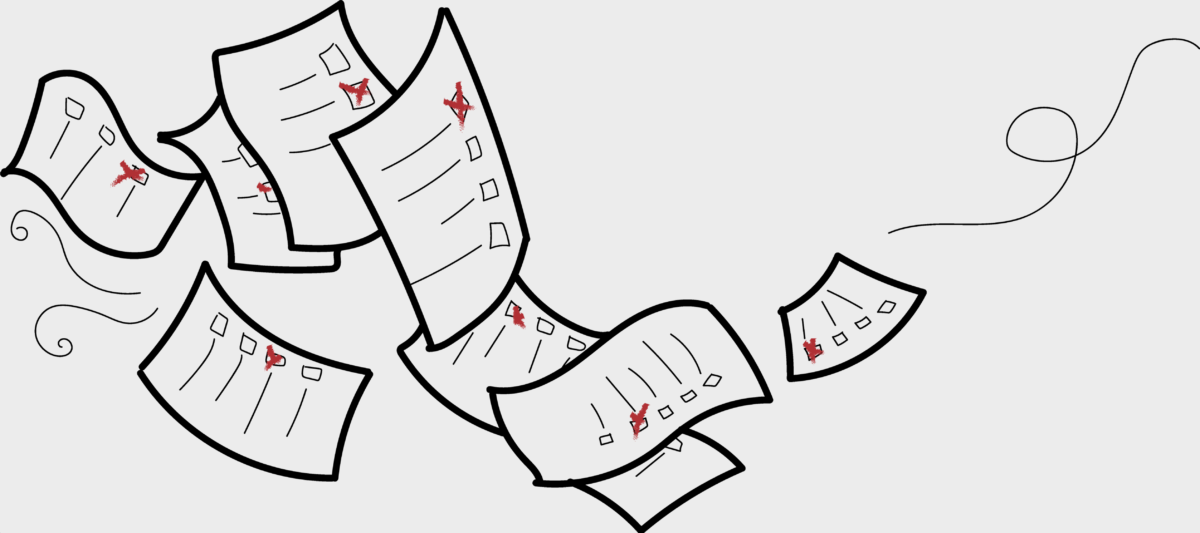
Canadians will head to the polls on October 21 to decide who they want as the next federal government. We have compiled a brief overview of the main political parties and their leaders in order to prepare you to make your vote count.
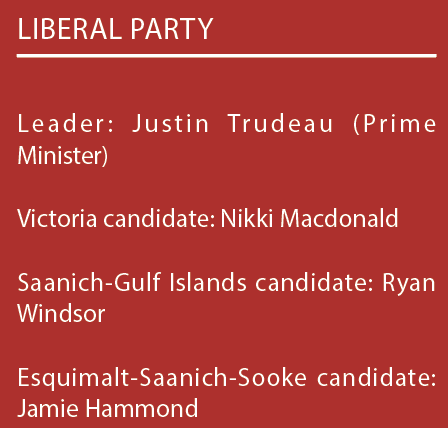
The Liberal Party currently forms a majority government and, in total, has spent more time in power than any other party in Canadian history. The Liberals are a centrist party which favours socially progressive policies such as universal healthcare and old-age pensions while keeping the economy tied to the market. This means that Canadians can expect higher levels of social services but also higher budget deficits under a Liberal government as opposed to a Conservative government. For the last four years, the Liberal party has been in power since a resurgence under the charismatic and young Justin Trudeau, who unseated the long-established Stephen Harper-led Conservatives. Since then, the Liberals have successfully instituted a (controversial) price on carbon emissions, welcomed thousands of refugees into the country, and worked hard to cultivate an image of respect towards women, minority groups, and the LGBTQ+ community. This has been tempered, however, by the (again controversial) purchase of the Trans-Mountain pipeline, an increase in government debt, and the SNC-Lavalin scandal in which the government allegedly put inappropriate pressure on the attorney general to consider a deferred prosecution agreement with the Quebec-based multinational corporation facing corruption charges.
The newly released Liberal party platform promises investment in Canada’s “middle class,” including an increase in child benefits and student loan relief. While the Liberals are also promising to meet climate change goals, their plan for reaching those goals or even what those goals will be is sparse in details. In this election period, Justin Trudeau will try to recover his image of charisma and positivity — which charmed not only Canada but the world in 2015 — and distance himself from the recently unearthed photos of him in blackface, which has historically been used as a racist caricature of minorities.
For: Carbon tax, acceptance of refugees, Trans-Mountain pipeline, increased social services in health care, child care, and education
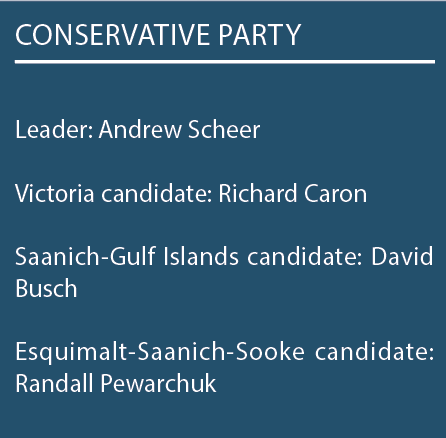
The Conservatives are the only party other than the Liberals to have formed federal government in Canada’s 152 year history. With Andrew Scheer at the helm, the Conservatives will hope to knock out the Liberals promising tax breaks, a balanced budget, and a resurgent energy industry. This platform not only appeals to those in the traditional conservative strongholds of rural Canada and oil-rich Alberta, but also amongst Canadians who oppose the carbon tax. While the Conservatives, like the Liberals, support a free-market economy, their values are more socially conservative and the party has historically opposed the legalization of gay marriage in addition to siding with the pro-life camp in debates on abortion. This means that, if elected, the party may repeal some support for policies which promote equality in the workforce and for the LGBTQ+ communities. However, Scheer has also stated that he considers the debate on both abortion and same-sex marriage to be a closed discussion. This is despite a video surfacing of Scheer opposing gay marriage during a parliamentary debate on the topic in 2005 for which he has not apologized.
During the campaign, the Conservatives are expected to attack the Liberals for their carbon tax and the SNC-Lavalin affair. The Conservatives are also expected to receive support from the majority of provincial governments, which are led by Conservatives. Scheer, a seasoned politician and former speaker of the house, knows how to motivate supporters — but may have a harder time appealing to swing voters wary of a return to the austere spending and cuts to social programs of the Harper era.
For: Oil industry, lower taxes, free market economy, strong military, traditional values, balanced budget.
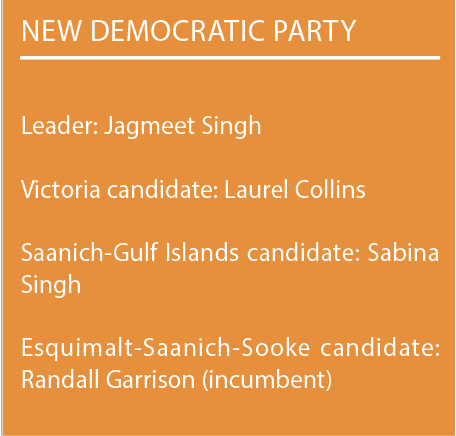
The New Democratic Party (NDP) is looking to make a comeback following their setback in 2015, when the party went from the official opposition back to their traditional place as a distant third party. Their hope is that a new, young, and charismatic leader will be able to rekindle the success that the NDP had under Jack Layton. However, Jagmeet Singh has already faced issues in appointing candidates and fundraising the money crucial for a large-scale election campaign. The NDP will focus on promoting their housing plan, which promises to build 500 000 houses in order to address the shortage of affordable housing, and their climate plan, which promises to reduce emissions by 38 per cent below 2005 levels by 2030.
The NDP has also supported the introduction of a universal pharmacare program, which would lower the cost of prescription drugs for all Canadians. While the NDP have over time drifted away from their socialist, working-class roots, they still rely on some support from labour unions. The NDP will also try to lessen the Green wave through the promotion of their own environmental policies. Whether the NDP can garner broad enough support to beat the Liberals or the Conservatives remains to be seen as the rise in taxes that would come with an NDP government still remains unpalatable to many Canadians, despite the resulting increase in social services. The NDP have also received backlash for wanting to stop production in the oil sands of Alberta, while at the same time supporting the B.C. NDP’s development of liquefied natural gas.
For: Pharmacare, affordable housing, comprehensive climate plan, more government regulation of economy.
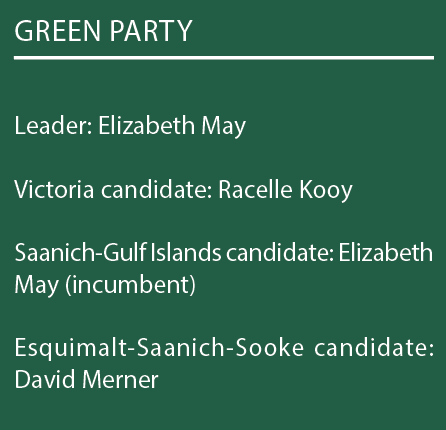
The Green Party, Canada’s traditional environmental-focused party, has worked hard to expand their appeal amongst voters, as well as to take advantage of climate change anxiety, with a new comprehensive, and broad platform. This platform includes the reduction of Canadian carbon emissions by 60 per cent below 2005 levels by 2030 and the transition away from oil and gas energy sources. This is combined with the promise of a universal pharmacare program which they will likely argue is more extensive than the NDP’s proposed program. To fund this, the Greens say they would increase corporate taxes and close loopholes.
The Green Party, however, has faced criticism regarding a lack of cohesion, with candidates disagreeing on their stance for key issues other than climate change, as well as confusion surrounding how strict party discipline over members would be if elected. Other parties also criticized Elizabeth May for suggesting that SNC-Lavalin do community service as punishment.While the Greens will not garner enough seats to form government due to their alienation of the energy heartland of Canada, the green wave that is sweeping across the world has certainly arrived in Canada, particularly amongst young voters concerned about the climate crisis. If these concerned voters act on this fear and vote Green, then the party could be in an advantageous position following the election to help decide who will form government in what many experts believe will be a minority situation.
For: Climate action plan, universal pharmacare, tax loophole closures.
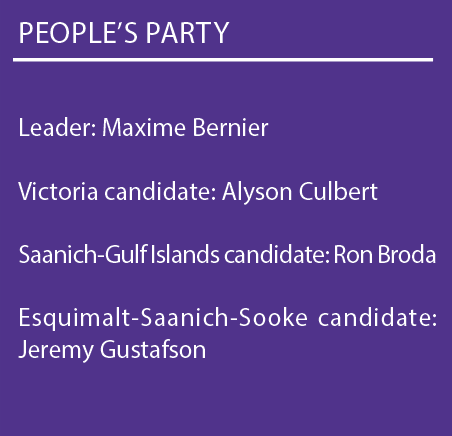
Canada’s newest political party, the People’s Party, was founded in 2018 by Maxime Bernier, following his failure to be elected as the new Conservative leader. The party promotes libertarian, anti-immigration, and one-culture policies. They have been criticized for being racist and ethno-nationalistic. Bernier has stated his goal of scrapping multiculturalism in Canada, and instead would promote policies that would force immigrants to assimilate to mainstream elements of Canadian culture. Bernier has also stated his belief that climate change is a natural process and denies that human actions are to blame. These policies have shown the People’s Party to be in the mould of the far-right populist parties that have been sweeping the globe for the better part of the last decade. While the party might not have much support outside Canada’s far-right factions, the People’s Party will provide an unknown element to the election and has the potential to shake up mainstream ideas of how politics in Canada works.
For: Fully free market economy, strict immigration regulations, abolishment of multiculturalism, denial of human-caused climate change.







